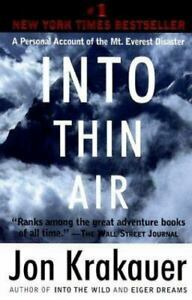Take a photo of a barcode or cover
Being a woman that loves to lose herself in a fantasy setting, I have spent many of my reading years actively avoiding non-fiction books. I had a lot of preconceived notions about non-fiction, chief among them being that they all read like stale textbooks. As I got older, though, I decided to dip my toes into the genre and ended up picking up A Walk in the Woods by Bill Bryson. I absolutely LOVED it and, just like that, a whole new genre was opened before me.
The main thing I loved about A Walk in the Woods was the narrative writing style. It was far from dry; it was witty and interesting and I couldn’t put it down. As I looked for more non-fiction books to read, I tried to find books that were written in a similar style. Someone suggested Into the Wild by Jon Krakauer, the story of a young man named Christopher McCandless who leaves his life behind to try and survive in the Alaskan wilderness. I was not disappointed. Krakauer definitely wrote with a conversational tone that sucked me into the story and held me in its grip until the end. So, when I noticed that his book about his experience on Mount Everest was available from Book of the Month Club, I picked it up.
So. This book. The delivery was similarly well received by me, but this book still fell flat. And I think it was because of the topic. Not because of the tragedy, though that was rather hard to read, but because mountain climbing just sounds AWFUL. The entire time I was reading this book, I couldn’t stop thinking, “Why are you people willingly putting yourselves through this?!” Krakauer goes into detail about the effects high altitude climbing has on the human body and NONE of it is pleasant. I suppose I get that people do it for the clout, but even reading this account from the viewpoint of a former climbing addict, I just… could not understand the appeal. And that made the tragedy seem that much more pointless.
I did enjoy Krakauer’s attempt to broach the subject of the commercialization of Mount Everest. I felt he spent a decent amount of time discussing what professional climbers felt about the subject and how climbing guides felt. I don’t think enough time was spent discussing how the commercialization has affected Nepal and the Sherpas, but I understand that it wasn’t meant to be the focus of the book. The focus was the tragedy and Krakauer’s attempt to try and give the most accurate account possible. Still, I felt like a little more time could have been spent exploring this topic.
Final thoughts: Though I still enjoyed Krakauer’s writing style, this topic and I just didn’t jive. Also, I will NEVER go mountain climbing. No thank you.
The main thing I loved about A Walk in the Woods was the narrative writing style. It was far from dry; it was witty and interesting and I couldn’t put it down. As I looked for more non-fiction books to read, I tried to find books that were written in a similar style. Someone suggested Into the Wild by Jon Krakauer, the story of a young man named Christopher McCandless who leaves his life behind to try and survive in the Alaskan wilderness. I was not disappointed. Krakauer definitely wrote with a conversational tone that sucked me into the story and held me in its grip until the end. So, when I noticed that his book about his experience on Mount Everest was available from Book of the Month Club, I picked it up.
So. This book. The delivery was similarly well received by me, but this book still fell flat. And I think it was because of the topic. Not because of the tragedy, though that was rather hard to read, but because mountain climbing just sounds AWFUL. The entire time I was reading this book, I couldn’t stop thinking, “Why are you people willingly putting yourselves through this?!” Krakauer goes into detail about the effects high altitude climbing has on the human body and NONE of it is pleasant. I suppose I get that people do it for the clout, but even reading this account from the viewpoint of a former climbing addict, I just… could not understand the appeal. And that made the tragedy seem that much more pointless.
I did enjoy Krakauer’s attempt to broach the subject of the commercialization of Mount Everest. I felt he spent a decent amount of time discussing what professional climbers felt about the subject and how climbing guides felt. I don’t think enough time was spent discussing how the commercialization has affected Nepal and the Sherpas, but I understand that it wasn’t meant to be the focus of the book. The focus was the tragedy and Krakauer’s attempt to try and give the most accurate account possible. Still, I felt like a little more time could have been spent exploring this topic.
Final thoughts: Though I still enjoyed Krakauer’s writing style, this topic and I just didn’t jive. Also, I will NEVER go mountain climbing. No thank you.
adventurous
emotional
informative
reflective
sad
tense
medium-paced
Översättningen till svenska av Jan Järnebrand uppfattades ibland som bristfällig.
adventurous
fast-paced
Felt the additional postscript was unnecessary and all it made me do was want to read The Climb. The tale was so heartwrenching all together. Decades later I'm curious if any other information has come to light or other versions of the story have been told, other than the movie version.
adventurous
dark
emotional
reflective
sad
tense
medium-paced
A cautionary tale of hubris that I couldn't put down. If you've ever had an inkling of wanting to climb Everest--read this! If you believe that climbing mountains more than 8,000 meters tall is an affront to god--read this!
For all the times I've seen this book recommended I didn't realize until I started reading it that Krakauer had actually been on the expedition he writes about. The people who said the first 2/3 are boring clearly have no patience for exposition; laying that groundwork is critical to a full understanding and appreciation of the final third of the book.
It was slightly ironic that he was critical of the impacts of Western mountaineering tourism on the Sherpas upon whom this industry relies, but at least he was honest about the hypocrisy. Krakauer's efforts to be fair and accurate are evident throughout his telling despite the limitations imposed by hypoxia and other challenges faced by anyone at an extreme altitude, and I found it a sign of his integrity and humanity that he held himself accountable for his role in the tragedy that occurred. I'm also empathetic to the grieving loved ones who lashed out at him following publication of his article and this book.
Overall I thought it was incredibly well done given the circumstances, though on further reflection it is a little off putting that Krakauer is critical of his fellow climbers. I hope that he and the other survivors have found some peace in the nearly 30 years since the events transpired.
For all the times I've seen this book recommended I didn't realize until I started reading it that Krakauer had actually been on the expedition he writes about. The people who said the first 2/3 are boring clearly have no patience for exposition; laying that groundwork is critical to a full understanding and appreciation of the final third of the book.
It was slightly ironic that he was critical of the impacts of Western mountaineering tourism on the Sherpas upon whom this industry relies, but at least he was honest about the hypocrisy. Krakauer's efforts to be fair and accurate are evident throughout his telling despite the limitations imposed by hypoxia and other challenges faced by anyone at an extreme altitude, and I found it a sign of his integrity and humanity that he held himself accountable for his role in the tragedy that occurred. I'm also empathetic to the grieving loved ones who lashed out at him following publication of his article and this book.
Overall I thought it was incredibly well done given the circumstances, though on further reflection it is a little off putting that Krakauer is critical of his fellow climbers. I hope that he and the other survivors have found some peace in the nearly 30 years since the events transpired.
adventurous
challenging
fast-paced
tense
medium-paced
adventurous
dark
tense
medium-paced
adventurous
sad
medium-paced
adventurous
emotional
informative
sad
tense
medium-paced





